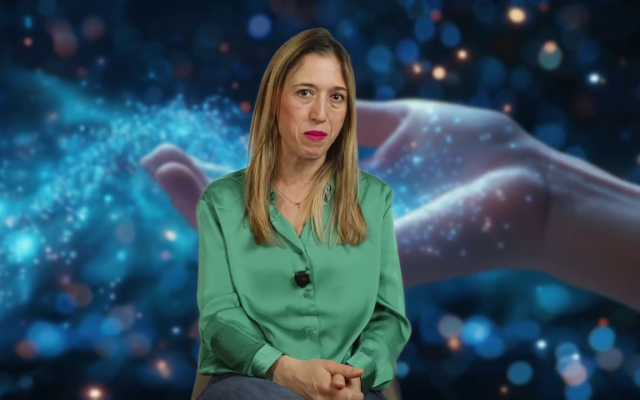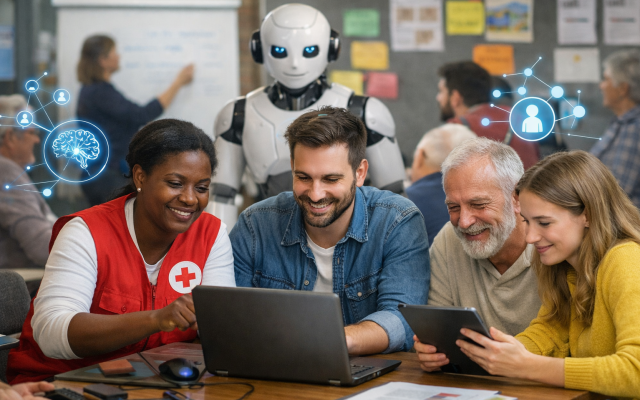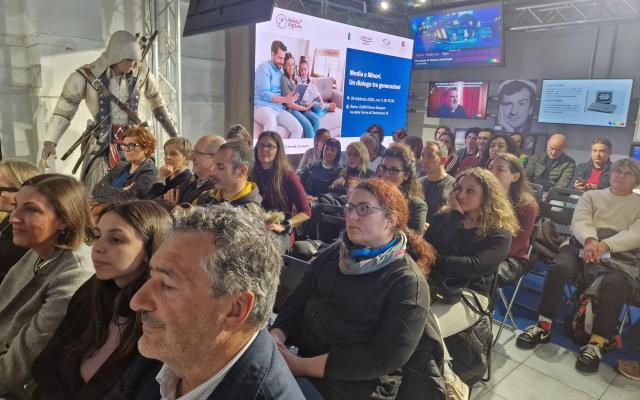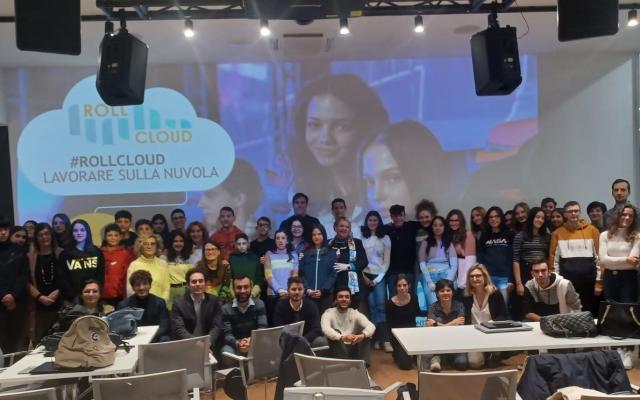Skill up day in Turin: students take centre stage in the future of work between HR and artificial intelligence
In Italy, artificial intelligence is the fastest growing technology segment (+38.7% in 2024), but only 8.2% of companies with at least ten employees use it in a structured way. However, the demand for new skills is growing: in the last year, job offers requiring AI-related skills have increased by 73%. [Anitec-Assinform, Il digitale in Italia 2025]
It is against this backdrop that yesterday, Thursday 16 October, the Luigi Einaudi Campus of the University of Turin hosted Skill Up Day, organised as part of Roll Cloud. Working on the cloud. The project is part of the Opening Future programme, a joint project between Google Cloud, Intesa Sanpaolo and TIM Enterprise, and was carried out in collaboration with the Department of Economics and Statistics “Cognetti de Martiis” and the valuable and passionate contribution of associate professor Elena Siletti, deputy director of teaching.
The day offered students an innovative learning experience, combining theoretical lessons, discussions with professionals and practical activities.
Speakers included:
- Cristiana Bellinazzi (Intesa Sanpaolo Professional Trainer for Social Issues), who illustrated the evolution of the employee experience and personnel management policies;
- Rebecca Ascalone (Project Manager Diversity, Belonging & Inclusion, Tim Enterprise), who presented corporate strategies for talent growth and diversity enhancement;
- Marta Casassa (AI Cultural Hub Manager, Service Concepts & Innovation, TIM Enterprise), who explored the role of emerging technologies and artificial intelligence in supporting HR teams;
- The trainers from the Fondazione Mondo Digitale, Samuele D'Avenia and Marco Rossi, who guided the young people in the practical application of digital tools.
The day ended with a group challenge: the students worked on real scenarios to imagine new opportunities in the world of work, developing innovative projects to be presented in plenary.
University students thus had the opportunity to engage with the transformations underway, acquiring new skills and visions to build a smarter, more inclusive and people-centred future of work.
Questions for the experts
Artificial intelligence is a strategic lever for innovation and competitiveness. What skills and sensibilities do you consider essential for young people preparing to enter increasingly digital and data-driven organisations?
Marta Casassa, AI Cultural Hub Manager, Service Concepts & Innovation, TIM Enterprise, responds
"Artificial intelligence is becoming pervasive in all organisations, but especially in large companies, with an impact on all processes, both internal, such as those addressed in today's workshop on HR, and external, for example, integrated into customer-focused products and services.
With this in mind, it is important to emphasise the highly multidisciplinary nature of artificial intelligence projects, which increasingly require the contribution of professionals with different skills. In general, I consider basic training in AI & Data to be important for everyone, in order to understand at least the technological drivers and trends, opportunities and, above all, risks and limitations.
For this type of technology, which evolves on an almost daily basis, it is essential to keep up to date, experiment and closely follow regulatory developments and best practices. I therefore consider curiosity, flexibility and critical thinking to be key characteristics for adapting to organisations and roles that are constantly evolving and changing.
I believe it is essential to foster discussion among colleagues, creating opportunities for peer-to-peer learning that fits well with the rapid pace of change in these issues. For this reason, we have recently launched an internal AI community, a virtual space where colleagues can keep up to date with articles, multimedia materials and testimonials, exchanging opinions and points of view.
How important is it to raise awareness among the younger generation of the value of diversity and inclusion as strategic levers for innovation and sustainable growth in organisations?
Rebecca Ascalone, Project Manager Diversity, Belonging & Inclusion, TIM Enterprise, responds
"I believe that the younger generations are ahead of us adults on issues related to diversity and inclusion, but I don't know how aware they are of the fact that these aspects play a decisive role in a company's ability not only to perform well, but also to imagine and build the future. For this reason, what I try to convey to them when talking about welfare is that it is in our best interest to ensure that our talents thrive, both inside and outside the company: a primary source of well-being is feeling part of a community that recognises your uniqueness and the value that your uniqueness brings. Using the very topical metaphor of the bubble, if we stay in our bubble, interacting only with those who think like us, we will have fewer opportunities to innovate. Some of the young people we talk to today will be the leaders of tomorrow, and it is important that in building their personalities and professionalism, they make room for their own uniqueness and that of others.
What skills do you consider essential today to accompany young people in their transition from education to the world of work, in an increasingly digital and interconnected context?
Cristiana Bellinazzi, Professional Trainer, Intesa Sanpaolo for Social Issues, responds
"I believe that today, the most useful skills for young people entering the world of work are a mix of technical knowledge, transferable skills and a proactive attitude towards change.
On the one hand, it is essential to have good digital literacy, to know how to use IT tools effectively and to communicate effectively in English. In many areas, more specific skills are also needed, such as the ability to analyse data, understand business processes or use new technologies, from artificial intelligence to management software.
On the other hand, companies are increasingly looking for soft skills such as collaboration, flexibility, problem-solving and effective communication. These are qualities that enable people to adapt to different contexts and work well in a team, even in international or digital environments. However, I think the most important skill is a willingness to learn continuously. The world of work is changing very rapidly, and those who know how to keep up to date, reinvent themselves and learn new things are better equipped to face future challenges.
In short, it is crucial for young people today to combine technical knowledge with curiosity, creativity and interpersonal skills: this balance is what really opens the door to professional opportunities. Speaking of what “we” can do, I would add that we need a strong ability to network, collaborating with schools, training organisations, businesses and institutions to build personalised and inclusive pathways.




